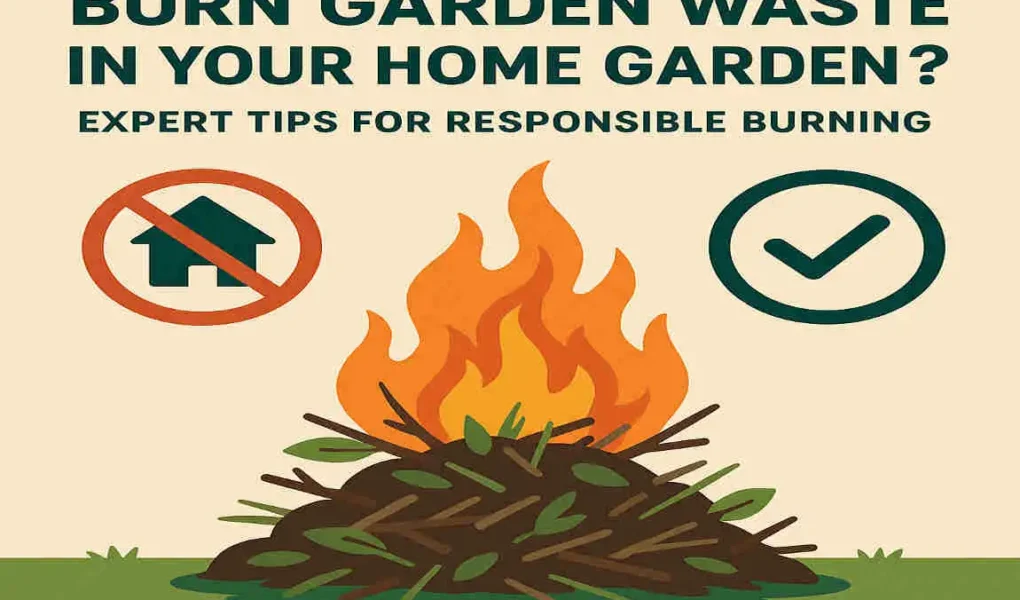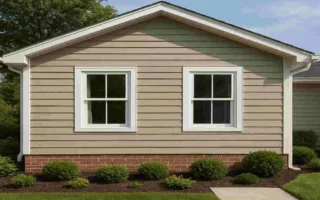Burning garden waste is a common practice among homeowners, especially when faced with heaps of fallen leaves, branches, and other organic debris. But have you ever stopped to consider: can you burn garden waste in your house garden safely and legally?
Many people approach garden waste burning without fully understanding the legal and environmental implications. Improper burning can lead to fines, health hazards, and even strained relationships with neighbors due to the risk of smoke or fire. This is why it’s crucial to adopt safe, legal, and environmentally responsible practices.
Understanding Garden Waste Burning: Safety and Legality
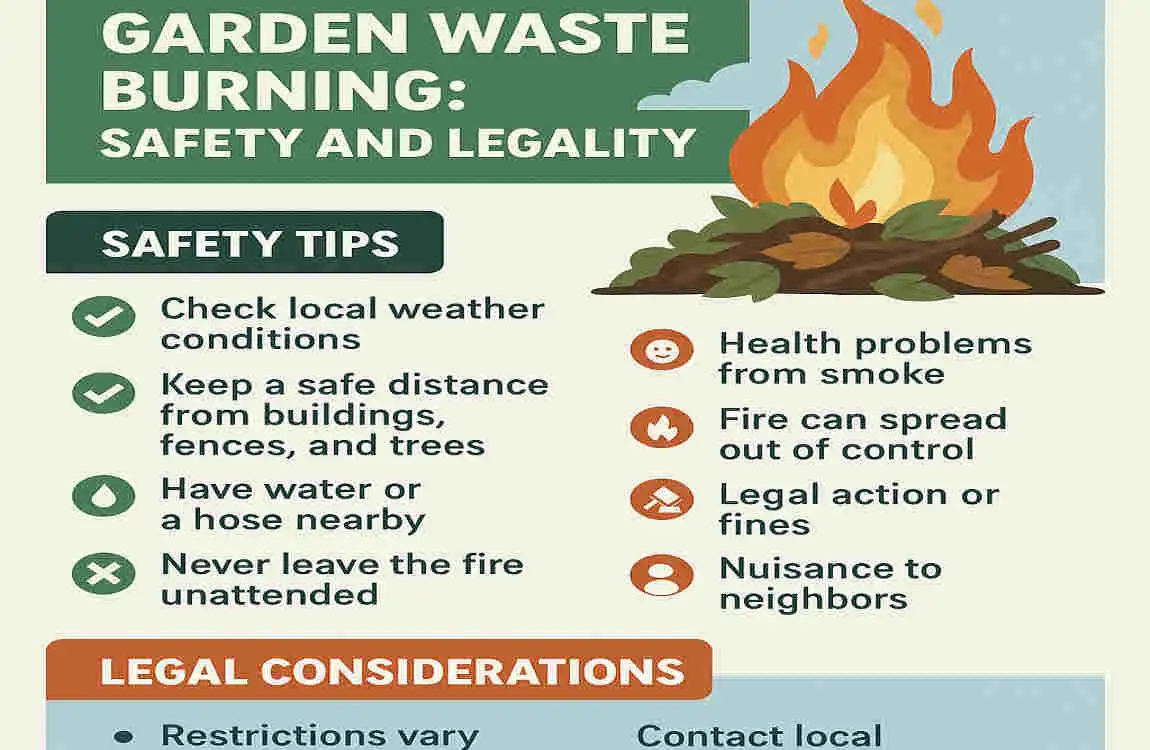
Before lighting a match, it’s essential to understand the rules and regulations governing the burning of garden waste. Laws vary by country, state, and even municipality, so it’s necessary to familiarize yourself with the specific guidelines in your area.
Local Laws and Environmental Regulations
Most local authorities have strict rules about when, where, and what you can burn in your garden. Many areas require homeowners to obtain permits before burning, while some regions have outright bans on open fires due to air quality concerns.
In addition to local laws, there are broader environmental regulations aimed at reducing air pollution. Burning certain materials can release harmful chemicals into the atmosphere, contributing to environmental damage and health risks.
Common Restrictions
- Prohibited Materials: Burning plastics, treated wood, rubber, or household waste is illegal in most places. These materials release toxic fumes that harm both people and the environment.
- Time of Year: Some areas only allow burning during specific seasons to minimize wildfire risks or air pollution during high-smog periods.
- Proximity to Neighbors: Burning waste too close to property boundaries or in densely populated areas may lead to complaints or legal action.
Legal Consequences
Failing to comply with these regulations can result in fines, penalties, or even lawsuits. For instance:
- Causing a nuisance: If your fire produces excessive smoke that disturbs neighbors, you could face legal action.
- Fire hazards: Uncontrolled fires that spread beyond your property can result in significant fines or liability for damages.
Pro Tip: Always check with your local council or environmental authority before burning garden waste. Doing so will help you avoid legal trouble and ensure you’re following best practices.
What Garden Waste Can You Safely and Legally Burn?
Not all garden waste is created equal. Understanding what materials are safe and legal to burn is key to reducing health risks and environmental harm.
Permitted Materials for Burning
Generally, you’re allowed to burn organic, untreated garden waste. These materials include:
- Dry Leaves and Twigs: Ideal for kindling and consistent burning.
- Small Branches: Provides a steady burn when appropriately dried.
- Grass Clippings: Can be burned in small amounts if sufficiently dried.
- Paper or Cardboard: Useful for starting fires, provided they don’t contain any coatings or chemicals.
Materials to Avoid
Burning the wrong materials can be dangerous and illegal. Here’s a list of items you should never burn:
- Wet or Green Waste: Produces excessive smoke and burns inefficiently.
- Plastics and Rubber: Release toxic fumes harmful to your health and the environment.
- Treated Wood: Contains chemicals that, when burned, can release hazardous gases.
- Household Trash: Not only illegal but also highly polluting.
- Painted or Varnished Materials: Emit harmful chemicals when burned.
Why Avoid Burning Prohibited Materials?
Burning prohibited materials can:
- Release toxic substances, such as dioxins and furans, into the air.
- Increase the risk of respiratory issues for you and your neighbors.
- Contribute to environmental harm by degrading air quality.
By sticking to permitted materials, you can ensure a safer and more eco-friendly burning process.
Expert Tips for Responsible Garden Waste Burning
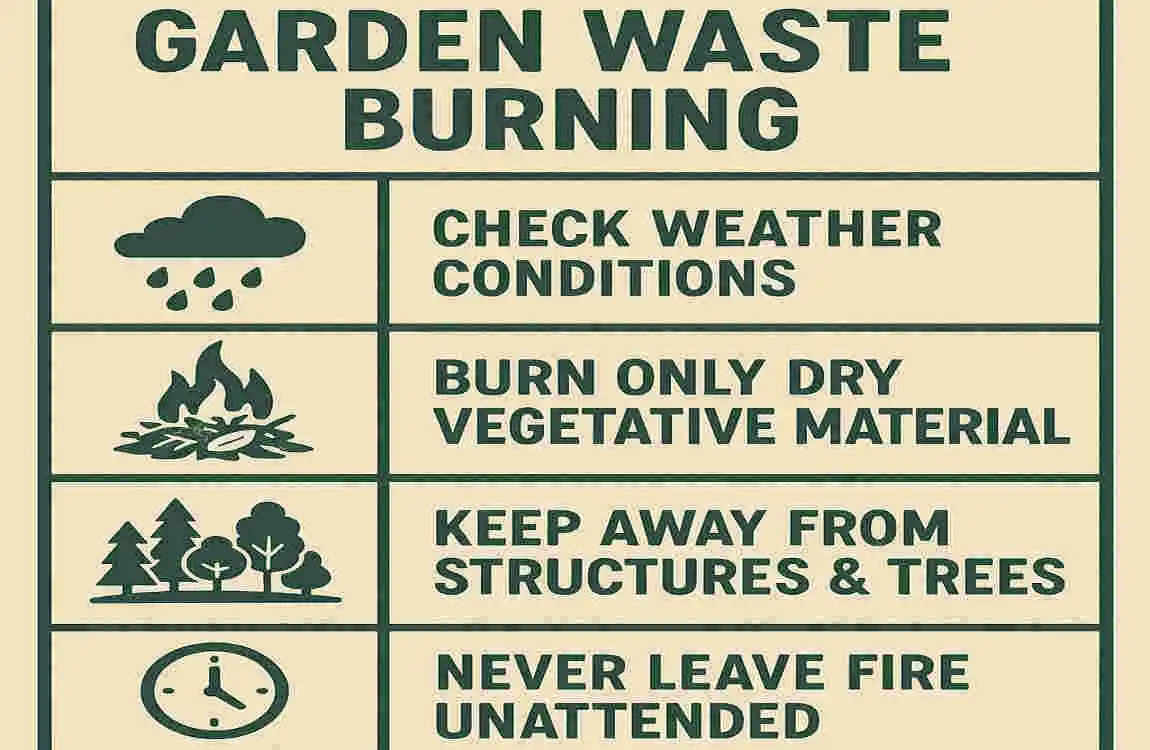
Burning garden waste may seem straightforward, but doing it responsibly requires thoughtful preparation and execution. Follow these expert tips to ensure safety and minimize environmental impact.
Preparation is Key
- Choose a Safe Location: Designate a spot far from trees, fences, or buildings. Ensure the area is clear of flammable debris and materials.
- Use Proper Equipment: Utilize fire pits, burn rings, or metal incinerators to contain the fire and prevent it from spreading.
- Check the Weather: Avoid burning on windy or overly dry days to reduce the risk of the fire spreading uncontrollably.
Best Practices for Burning
- Burn Only Dry Waste: Wet materials produce excessive smoke, which can bother neighbors and harm air quality.
- Start Small: Begin with a small pile of waste and gradually add more as the fire burns down.
- Use Safe Ignition Methods: Stick to matches or lighters. Avoid using accelerants like gasoline, which can cause dangerous flare-ups.
- Monitor the Fire: Never leave the fire unattended. Keep a bucket of water, hose, or fire extinguisher nearby.
Timing Matters
The best time to burn garden waste is during calm weather conditions to prevent the fire from spreading uncontrollably. Early morning or late evening often works best, as the air is usually more relaxed and more peaceful at these times.
Environmental and Neighborhood Considerations
Burning garden waste doesn’t just affect you—it also impacts your neighbors and the environment. Here’s how you can minimize these effects.
Effects of Smoke and Pollutants
Smoke from burning garden waste contains particles and chemicals that can harm air quality. These pollutants can:
- Aggravate respiratory conditions like asthma.
- Contribute to smog formation.
- Harm wildlife and vegetation in your area.
Alternatives to Burning
Instead of burning, consider these eco-friendly alternatives:
- Composting: Turn organic waste into nutrient-rich compost for your garden.
- Green Waste Collection Services: Many local councils offer curbside collection for garden waste.
- Mulching: Shred leaves and branches into mulch to enrich your soil.
Communication with Neighbors
Before burning, it’s a good idea to inform your neighbors. This simple act of consideration can prevent misunderstandings and complaints.
Step-by-Step Guide: How to Safely Burn Garden Waste in Your Home Garden
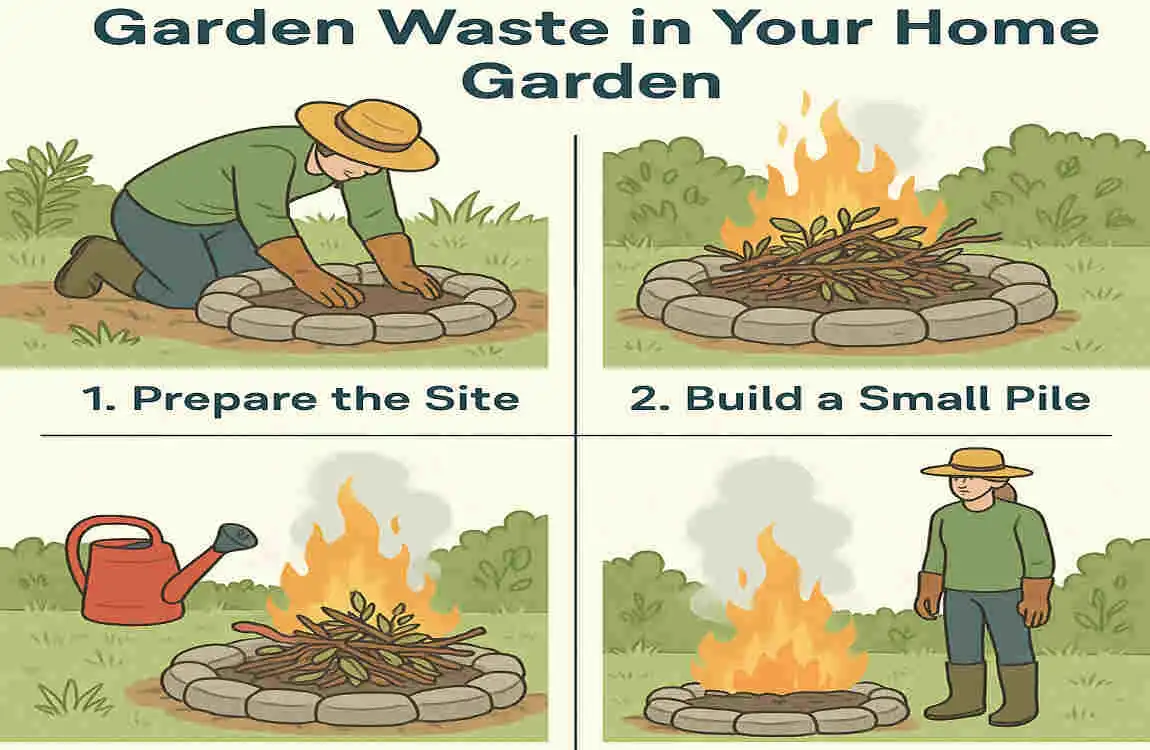
Here’s a straightforward step-by-step guide to burning garden waste responsibly:
- Check Local Regulations: Ensure burning is allowed in your area and obtain any necessary permits.
- Gather and Dry Waste: Only burn dry, untreated garden waste for a cleaner burn.
- Prepare the Area: Set up a designated fire pit or metal container.
- Ignite Safely: Use safe methods, such as matches or lighters, to start the fire.
- Burn in Small Amounts: Add waste gradually to maintain control over the fire.
- Monitor the Fire: Stay vigilant and keep extinguishing tools nearby.
- Fully Extinguish: Once finished, douse the fire thoroughly with water to prevent reignition.
Frequently Asked Questions (FAQs)
Can you burn garden waste at any time of year?
No, many regions restrict burning to specific seasons. Check with your local council for guidelines.
What should you do if your smoke annoys neighbors?
Apologize and take measures to reduce smoke, such as burning only dry materials and choosing a low-wind day.
Are special permits required for burning garden waste?
In many areas, yes. Always check with local authorities to determine if you need a permit.
What should you do with wet or green garden waste?
Consider composting or using a green waste collection service, as these materials are unsuitable for burning.
What to do if a garden fire gets out of control?
Immediately call emergency services and try to contain the fire using water or a fire extinguisher.

